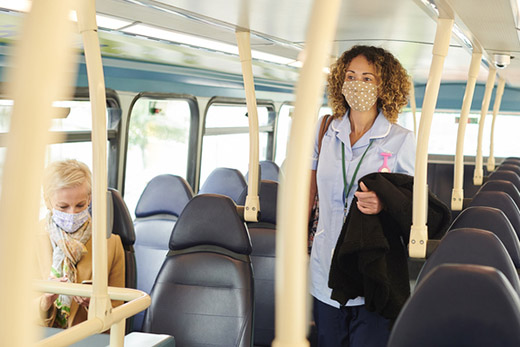ATLANTA – In a large study of U.S. health care workers in three states, researchers found that community exposure to COVID-19 was associated with COVID-19 infection in health care workers, but specific occupational activities in a hospital or health care setting were not. The findings were published in the Journal of the American Medical Association (JAMA) Network Open by researchers from Emory University in Atlanta, Johns Hopkins University in Baltimore, University of Maryland in Baltimore, Rush University in Chicago and the Centers for Disease Control and Prevention (CDC).
More than 24,000 health care workers took part in the study between April and August 2020 across four large health care systems which collaborate in the CDC’s Prevention Epicenter Program and conduct innovative infection prevention research. Each site conducted voluntary COVID-19 antibody testing on its health care workers, as well as offered a questionnaire/survey on the employees’ occupational activities and possible exposures to individuals with COVID-19 infection both inside and outside the workplace. They also looked at three-digit residential zip-code prefixes to determine COVID-19 prevalence in communities.
“After reviewing lab results from antibody testing, survey results and community prevalence across four geographically-diverse health care systems, we found community exposures to COVID-19 were most strongly associated with positive antibody tests in health care workers,” says Jesse Jacob, MD, associate professor of medicine in the Division of Infectious Diseases, Emory University School of Medicine, associate professor of epidemiology at Rollins School of Public Health at Emory and co-first author on the JAMA Network Open publication. “Being around patients and taking care of patients with COVID-19 in a health care setting were not significantly associated with positive antibody testing. All of the protective measures, such as personal protective equipment (PPE) and infection control policies and procedures, are keeping our health care workers safe.”
Among all sites, more than one-third of health care workers surveyed reported working in inpatient settings, nearly 10 percent reported working in the emergency department and nearly half worked in other health care areas. Half of survey respondents reported caring for patients with COVID-19 or working in a COVID-19-designated unit. At all sites, the nurse was the most common job role.
“Our research suggests that workplace factors were not a major source of risk for SARS-CoV-2 seropositivity in health care workers,” says Julia Baker, PhD, postdoctoral fellow in Rollins School of Public Health at Emory University and co-first author on the publication. “Nurses were not more likely to be seropositive, nor were those who worked in the emergency department or who cared for patients with COVID-19 diagnoses after accounting for demographic and community factors.”
Seropositivity, also known as having a positive COVID-19 antibody test, was 4.4 percent overall in the study.
The researchers did find that health care workers younger than 30 years of age had higher odds of positive antibody tests compared with health care workers aged 60 years and older. Health care workers of Black race had more than twice the odds of being seropositive compared with white health care workers.
“The connection to younger health care workers and increased risk of positive antibody testing is likely reflective of the community-based behaviors of younger people, as the odds of seropositivity generally decreased with increasing age in our study,” says Scott Fridkin, MD, professor of medicine in the Division of Infectious Diseases, Emory School of Medicine and professor of epidemiology at Rollins School of Public Health. “Also, as seen in similar study results, Black race is associated with higher seropositivity in health care workers.” Fridkin is also an author on the JAMA Network Open paper.
The study does have some limitations, including different laboratory methods used across sites, a non-standardized questionnaire given among the sites and volunteers signing up to take part in the study rather than focusing on certain employees/job positions.
“We believe this research gives a broad, multi-site and graphically-diverse look at presumed COVID-19 risk factors associated with health care workers, and highlights the risks of workplace role and caring for patients with COVID-19 were not associated with increased risks of SARS-CoV-2 infection,” says Jacob. “Continued infection prevention strategies in hospitals, mitigating risks outside the health care setting and COVID-19 vaccination will be beneficial in keeping health care workers safe.”
This study was supported in part by the CDC’s Prevention Epicenters Program and grant number T32AI074492 from the National Institute of Allergy and Infectious Diseases.

